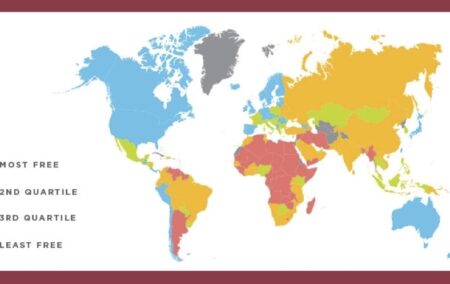Of the 165 jurisdictions ranked in the Fraser Institute’s 2023 Economic Freedom of the World Report (EFW), South Africa occupies the 94th position (this report of the EFW uses 2021 data).
The country’s best performance on the EFW occurred in 2000, when it ranked 47th. The country therefore falls under the third quartile on the Index, composed of those countries that are either stuck in terms of increasing economic freedom (in the best case), or steadily undermining economic freedom (in the worst case).
Countries are ranked across five categories: Size of Government, Legal System and Property Rights, Sound Money, Freedom to Trade Internationally, and Regulation. South Africa’s best score is in the Sound Money category, at 8.16 (down from 8.22 in both the 2015 and 2019 EFW editions). The weakest area is that of Legal System and Property Rights, where the country scored 5.76 (down from the higher mark of 5.94 in 2015).
The importance of increasing and bolstering economic freedom lies in more than mere GDP numbers. In countries with more economic freedom, citizens experience, on average, better-quality lives. Compared to nations in the bottom quartile of the EFW, with an average per-capita GDP of $6,324 in 2021 (PPP constant 2017, international $), nations in the top quartile had an average income of $48,569. In the bottom quartile the average income of the poorest 10% of people was $1,740 (PPP constant 2017, international $). In the top quartile this figure was $14,091. As the EFW highlights, the average income of the poorest 10% of people in the most economically free countries (such as Singapore, the US, Denmark, Australia, and Canada), ‘is more than twice the average income of all people in the least free nations’.
Where economic freedom is encouraged and strengthened (versus those countries where it is undermined and rolled back), businesses and citizens are indirectly incentivised to take a bet on that country’s future. Property rights are more secure, returns on investment are somewhat more predictable, society is relatively more stable, and the rule of law, freedom of speech and freedom of religion are protected (to a greater extent than is the case in other locations).
Those kinds of conditions lead to material improvements in people’s quality of life. Poverty alleviation and the improvement of quality of life are never a given. If the conditions are not conducive to them, such improvements will either not occur or will slowly be rolled back (possibly never to be recovered again).
According to the latest EFW, 31.45% of the population in the lowest quartile experience extreme poverty (defined as US$1.90 per day); for the top quartile that population figure is 2.02%. In the bottom quartile life expectancy is 65.0 years, and rises to 80.8 years in the top quartile. Infant mortality in the bottom quartile is 39.1 per 1,000 live births; in the top quartile it is 4.2 per 1,000 live births.
Globally, the trend has pointed towards less average economic freedom. In 2020 the global average economic freedom score rating fell to 6.77 – where it remained for 2021. By contrast, between 2000 and 2019 the average rating increased from 6.58 to 6.94; as a result, people’s average quality of life increased (this was also the case in South Africa, a trend which decidedly reversed around 2008/09). Most governments’ responses to the Covid-19 pandemic saw a tendency towards state control and power, at the cost of individual and economic freedoms. The overall consequence is one of declining economic growth and quality of life, especially for citizens in the developing economies.
South Africa’s declining trend of economic freedom (with continued decreases in most citizens’ quality of life) will most assuredly remain, especially if the current government’s ideological and policy programmes continue to be implemented. These include centralising more control in the hands of the state, suffocating the private sector and the individual’s ability to create wealth, and more forced dependency on the state (for measly grants).
In the policy space, expropriation without compensation (in the form of the Expropriation Bill), and placing the management of healthcare in the hands of the state (through the proposed National Health Insurance scheme), represent significant threats to economic freedoms. Restrictive and rigid labour laws remain, the state takes an ever-larger share of economic activity (with little in terms of effective, capacitating spending and investments in areas such as infrastructure), and a more dirigiste, protectionist trade policy is being created (through localisation policies).
The upshot of all these ingredients is less incentive for local and foreign investors to take a punt on South Africa. As a consequence, business formation and job creation will be more difficult.
Improving people’s quality of life could take off to a substantial degree, but firstly the focus must shift towards protecting and strengthening economic freedoms.

